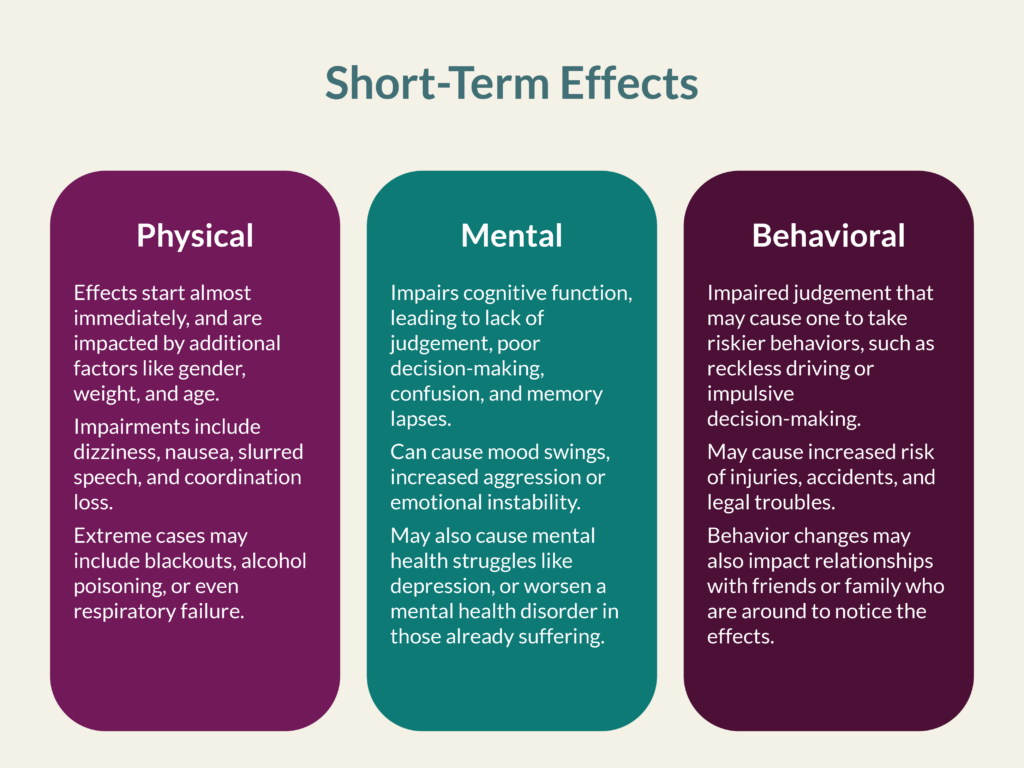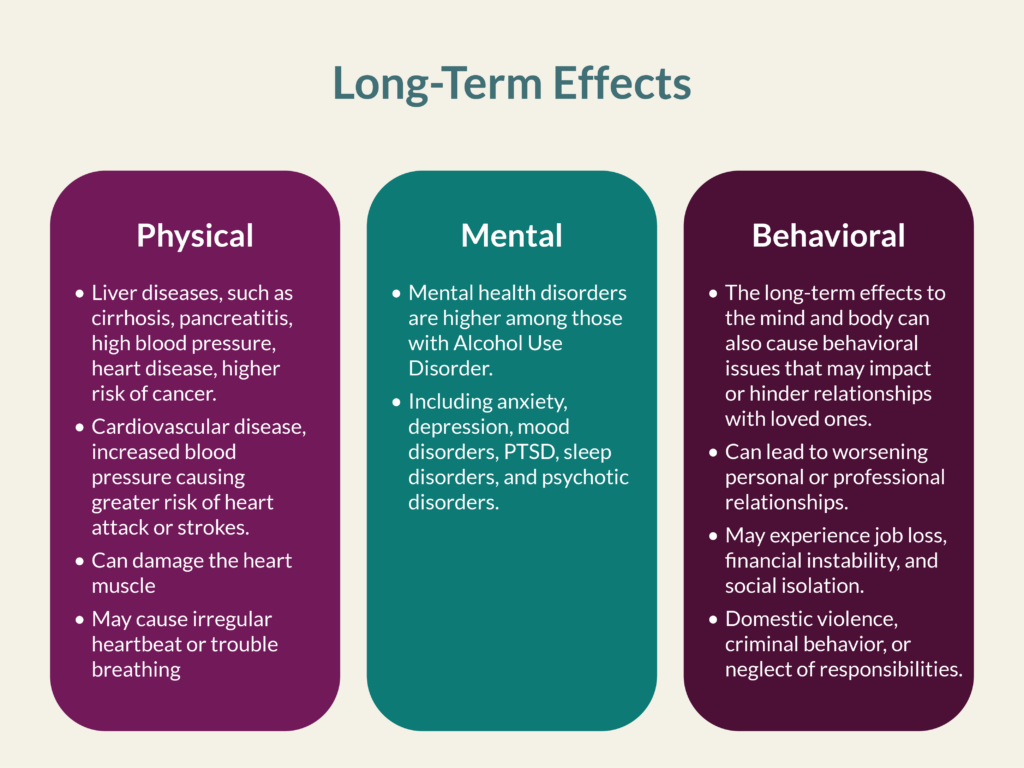While drinking alcohol in moderation may not seem harmful, excessive and prolonged consumption can lead to severe short-term and long-term effects on both mentally and physically. Recognizing the effects of alcohol and understanding what it does to one’s health helps to prevent abuse and overconsumption.
If you or someone you know is experiencing the effects of alcohol addiction due to overconsumption, Behavioral Health Centers can help through outpatient, inpatient, and detox programs.
Short-Term Effects

Your body can experience the short-term effects of alcohol starting only five minutes after consumption. Even worse, that’s how long it takes for it to reach the brain. From there, you may begin to experience both physical and mental health effects from consumption. With those who overconsume alcohol, the risks can be higher, including a more severe impact on the brain and even alcohol poisoning.
Physical
The physical short-term impact that alcohol has on the body starts almost immediately, leading to a range of physical impairments. Even after a few drinks, individuals may experience dizziness, nausea, slurred speech, and loss of coordination. In more extreme cases of excessive alcohol consumption, individuals can experience blackouts, alcohol poisoning, and even respiratory failure, which can be life-threatening.
Alcohol enters your bloodstream as soon as you take a sip. The more you consume alcohol in one sitting, the more you increase your blood alcohol concentration (BAC) level. This measures the amount of alcohol in the bloodstream.
The short-term effects of alcohol are also impacted by other factors, including gender, weight, and age. Young people tend to binge drink or heavily consume alcohol more than those who are old. Those in their 20s, and even younger than 21, tend to drink socially. It’s not uncommon for younger people to encourage each other to drink heavily in parties and other social settings. In addition, women biologically have a lower tolerance to alcohol than men. It takes only four drinks in one sitting for women to reach the stage of binge drinking, while it takes men five. This is due to women having less water in their bodies and higher percentage of body fat. This is also a reason why body weight impacts how much an individual feels the short-term effects of alcohol. The lower the body weight, the less blood and water a person has. Smaller people will feel the effects of alcohol faster than a heavier person.
Mental
In the short-term, alcohol impairs cognitive function, leading to lack of judgment, poor decision-making, confusion, and memory lapses. Individuals may struggle to focus or recall recent events. Additionally, alcohol can cause mood swings, leading to increased aggression or emotional instability. Because of the effects of alcohol on the brain, heavy drinking can cause mental health struggles, such as depression, or exacerbate a mental health disorder in those who are already suffering.
Behavioral
Because alcohol consumption leads to impaired judgment, those experiencing the short-term effects of alcohol use may partake in riskier behaviors, such as reckless driving and impulsive decision-making. People under the influence may engage in actions they would normally avoid, increasing the risk of injuries, accidents, and legal troubles. These changes in behavior can also impact relationships with friends or family who are around to notice the effects.
Long-Term Effects

Over-time, excessive consumption of alcohol can wreak havoc on the body and mind. The longer an individual continues to drink heavily (and frequently), the greater risk they put on their physical and mental wellbeing. Consistent heavy drinking can also lead to withdrawals, which occur only an average of six hours after someone’s last drink if they suffer from alcoholism.
Physical
Prolonged alcohol addiction can lead to devastating effects on the body. Chronic drinking can lead to liver diseases, such as cirrhosis, pancreatitis, high blood pressure, heart disease, and an increased risk of cancer. Alcohol also weakens the immune system, making individuals more susceptible to infections and illness.
In addition to liver disease, there is also a greater risk of cardiovascular disease. Drinking alcohol increases blood pressure, increasing the risk of heart attacks or strokes. It can also damage the heart muscle, making it less efficient at pumping blood. When an individual consumes alcohol, they may experience irregular heartbeat or trouble breathing. Over time, this can get worse, and even cause a life-threatening risk.
For those hoping to have kids in the future, long-term alcohol consumption can disrupt hormone production. This may be first noticeable through an irregular menstrual cycle or erectile dysfunction. Over time, this can lead to infertility.
Mental
According to the National Institute on Alcohol Abuse and Alcoholism, mental health disorders are higher among persons with alcohol use disorder (AUD) than with the general population. This includes anxiety, depression, and other psychiatric disorders, such as mood disorders. The most common co-occurring mental health disorders to alcohol abuse are:
- Anxiety – including generalized anxiety disorder, social anxiety disorder, and panic disorder
- Depression
- Mood disorders – including major depressive disorder and bipolar disorder
- PTSD
- Sleep disorders
- Psychotic disorders
Those suffering from both mental health and alcohol abuse should seek treatment from an inpatient or outpatient treatment program. If excessive alcohol use has led to withdrawals, first seek treatment from a detox program for alcoholism.
Behavioral
The long-term impact of alcohol abuse on the mind and body can also cause behavioral issues and hinder relationships with loved ones. Chronic alcohol addiction often leads to deteriorating personal and professional relationships. Individuals may experience job loss, financial instability, and social isolation. Alcoholism can also contribute to domestic violence, criminal behavior, and neglect of responsibilities, further deepening the impact on one’s quality of life.
Addressing the Effects of Alcohol Addiction
When alcohol consumption becomes an issue, whether it involves short-term or long-term abuse, there are plenty of treatment options available. Treatment programs for alcohol addiction are designed to help individuals reduce and eliminate their dependency on alcohol safely, in a way that does not further harm the mind and body. For those who also experience mental health struggles, there are treatment programs involving the use of different therapeutic modalities to heal the mind on the road to recovery.
For long-term alcohol abuse, a detox program is more commonly needed than with short-term abuse. After that, both short-term and long-term alcohol users can seek treatment from an inpatient (residential) or outpatient (IOP) treatment program.
How Long Do the Effects of Alcohol Last?
The duration of alcohol’s effects varies based on factors such as the amount consumed, frequency of use, and an individual’s metabolism. Short-term effects can last from a few hours to a full day, depending on alcohol levels in the bloodstream. However, long-term effects can persist for months or even years. Physical damage to the liver or brain may be irreversible, while mental and behavioral consequences may require prolonged treatment and support. The journey to recovery is different for everyone, but with the right help and commitment, individuals can reclaim their health and well-being.









